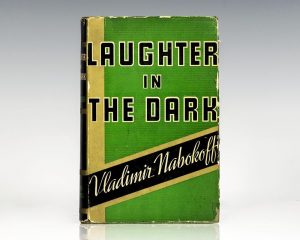
‘Laughter in the Dark’ novel review
By Ethan Gibson, Contributor
Vladimir Nabokov, author of the scandalous Lolita, created (and translated into English) another darkly comical tale of illicit romance gone irresistibly awry in his 1932 novel Laughter in the Dark. The story seems familiar at first: A wealthy, middle-aged, married man falls haplessly into infatuation with an unattainable young beauty, and she shrewdly manipulates his love for material gains. It is Nabokov’s adept and often hilarious writing of these characters that makes Laughter such a gem. (Spoilers ahead!)
I would primarily recommend Laughter in the Dark to those who prefer unconventional romance stories. This is really a cruel tale, but an enjoyable one nonetheless. The novel’s tone seems to hold very little pity or even sympathy for its characters. Albinus the middle-aged art critic is happily married—until he glimpses the young Margot, an usher at a local cinema and an aspiring (though wholly untalented) actress. Their eventual affair proves to be mutually beneficial, in an entirely toxic manner. Albinus, delusional as ever, is motivated by a lust he calls love—as the narrator explains, “Albinus [had] never been very lucky in affairs of the heart.” Margot—not unfamiliar with illicit affairs despite her youth—is after Albinus’s wealth and status, hoping that he will bring her into the high society of German cinema. Her aim of gradually taking as much of his money as possible crystallizes when she is unexpectedly reunited with the first love of her life, Axel Rex—who also happens to be an acquaintance of Albinus.
The history between Margot and Axel—of which Albinus is ignorant—is rekindled when they begin an affair of their own behind Albinus’ back. They prove an especially devious pair as Axel wedges himself into Albinus’ life, all the while scheming with Margot to take the fortune of her foolish older lover. I should say that to discuss Albinus’ status as one of the greatest losers in twentieth-century literature is not a spoiler. The novel begins like this: “Once upon a time there lived in Berlin, Germany, a man called Albinus. He was rich, respectable, happy; one day he abandoned his wife for the sake of a youthful mistress; he loved; was not loved; and his life ended in disaster.” Nabokov’s narrator sees no problem revealing the broad outline of Albinus’ life, claiming that there will be “profit and pleasure in the telling” of his story.
There is indeed plenty of “profit and pleasure” in this slim, irreverent novel. It’s hard to call it a tragedy because the characters involved are ultimately and thoroughly unsympathetic. They receive the inevitable consequences of their various follies—Albinus is punished for throwing away his family and happiness, and Margot eventually pushes her luck too far. Axel Rex—Margot’s true lover—is arguably the antagonist of the novel. It is his encouragement of Margot (and her parasitic exploitation of Albinus) that drives the plot to ruins. Rex emerges as a particularly loathsome villain as he escapes this sordid business without facing any consequences.
What is a reader to make of this petty domestic drama set in an unfamiliar past? Perhaps one moral of this story is that love can be far uglier than popular depictions tend to suggest.


